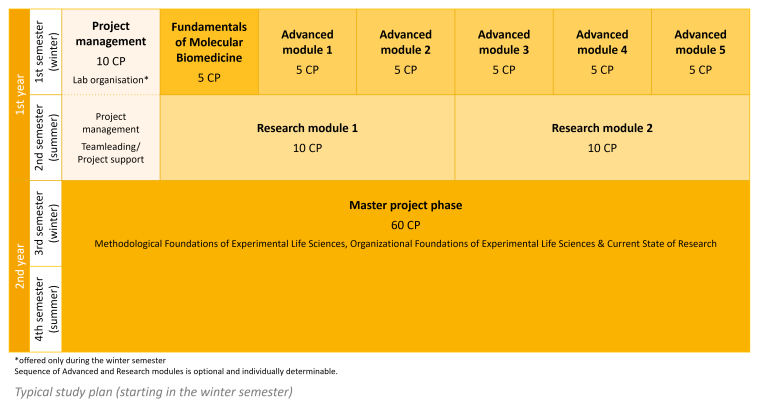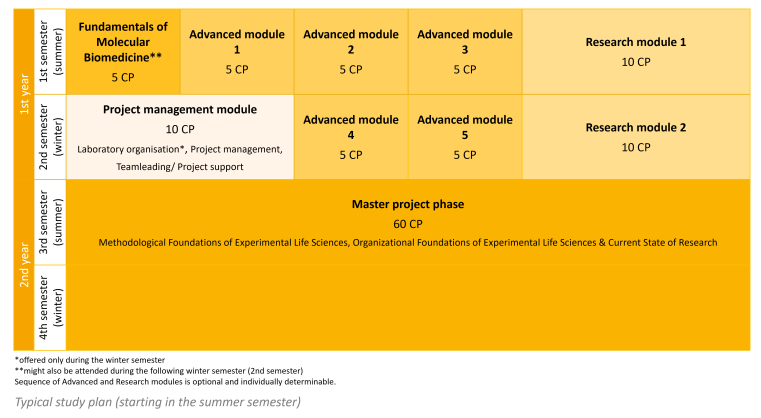General

© Uni MS Fachbereich Biologie The degree course focuses on molecular mechanisms of cellular and disease-relevant processes. You will be prepared for the independent development of a research project and involved in the ongoing projects. The Master Molecular Biomedicine is an excellent qualification for a doctorate in the life sciences.
The accreditation by the ASIIN guarantees that the educational goals and the study contents meet international quality standards.
Begin: Winter and summer semesters
Standard period of study: 4 semesters
Degree: Master of Science (MSc)
Language of instruction: German
Download Flyer (in German)
Examination regulations (only in German):
https://www.uni-muenster.de/imperia/md/content/wwu/ab_uni/ausgabe02/beitrag0201.pdf
The Master course Molecular Biomedicine offers:- Orientation towards research with a broad range of possible specializations
- Focus on lab experience
- small groups and very good mentoring (internships with 1 to 12 participants max.)
- mostly free choice of modules (one mandatory module specific to the programme)
- Integration and support of study time abroad
- practical introduction to the methods and concepts of scientific research
- Teaching of interdisciplinary key skills, e.g. in the areas of project leadership, communication and team work
- thorough development of a research project during the Master thesis
Curricular design

Study plan with start of study in the winter semester© FB Biologie 
Study plan with start of study in the summer semester© FB Biologie During your study course you will complete
- 5 advanced modules, each four weeks (FGM, 5 credit points each)
- 2 research modules, each eight weeks (FOM, 10 credit points each)
- a project management module (PLM, 10 credit points)
- obligatory module ‚Fundamentals of Molecular Biomedicine’ (four weeks, 5 credit points)
- the Master's thesis (60 credit points, approx. 10 months) including the corresponding modules:
- 'Current State of Research’ (10 credit points)
- 'Methodological and Organizational Foundations of Experimental Life Sciences' (8 credit points)
- final defence (12 credit points)
You can find the course catalogue with all modules currently offered under the following link:
https://mhbbio2.uni-muenster.de/modulhandbuch/student/MSc_Biomed/StudMScBiomed.phpThe first year of study is dedicated to completing the advanced and research modules, as well as the mandatory module. The freely selectable FGMs and one FOM can also be taken as external courses from other faculties of the university, at external research institutions, or at a company (up to a maximum of 40 credit points outside the University of Münster).
In the second year of study, the master's thesis is prepared. Over approximately 10 months, an independent scientific research project is executed and then defended in a public presentation. The master's thesis phase is complemented by the modules 'Methodological and Organizational Foundations of Experimental Life Sciences' (MGel and OGeL) and 'Current State of Research.' These modules are completed within the research group where the thesis work is carried out.
There is the possibility to complete the master's thesis outside of the University of Münster, for example, in the industry or at research institutions. It should be noted, however, that 40 out of the 120 credit points must be earned at the University of Münster.Throughout the program, in addition to scientific competencies, interdisciplinary skills in project and teamwork, as well as leadership skills are acquired within the project management module.
The possible career fields for graduates of the ‘Molecular Biomedicine’ master's program encompass a wide range of scientific activities in life sciences, particularly in biomedical areas, within industry, universities and research institutions. The master's degree also provides you with the opportunity to further your qualifications through relevant doctoral programs.
How to apply
Application is submitted via the registrar's office:
https://www.uni-muenster.de/studieninteressierte/en/bewerbung/master.html
Information about online application, including dates like application deadlines, can also be found on this website.Admission to the degree course is granted through a selection that is made by the selection committee of the degree course. A 2.3 BSc final grade (German scale) minimum is required. A preliminary certificate with the required grade will be accepted. Alternatively, the applicant could prove that he/she ranks amongst the upper 40% of his/her year.
The selection committee will additionally arrange interviews, usually via Zoom, to talk to the applicants personally in form of free, individual conversations which can relate to various aspects that are relevant for participation in the Master's program (such as motivation, previous experience, current level of knowledge). For the winter semester application phase, the interviews will usually take place during the second week of August.Decision of admittance is based on the Bachelor's final grade, the personal interview with the applicant and the submitted documents.
A proof of German language proficiency at DSH-2 level must be submitted with the application by the deadline, unless the degree was obtained at a German-language institution. Further information can be found at the following link:
https://www.uni-muenster.de/studieninteressierte/en/studienvoraussetzungen/sprachkurse/index.htmlIn this checklist you can find a comprehensive overview on the documents and steps required for a successful application:
CHECKLISTFAQ Application
Are there selection interviews for the Master's programme application?
When does the semester welcome event take place and where can I get information about it?
Can I apply for an MSc programme with a bachelor's degree in two subjects?
Can I apply for more than one MSc programme?
What happens if my provisional grade changes after I have submitted my application?
Can I also be admitted with a grade point average worse than 2.3?
What happens if my certificate is not available until after the enrolment deadline?
I have completed more modules in my Bachelor's degree than required - can I have them recognised?
Are there selection interviews for the Master's programme application?
For the MSc Molecular Biomedicine there are always selection interviews. These are free, individual interviews and may cover various aspects relevant to participation in the MSc programme (e.g. motivation, previous experience, current level of knowledge). The interviews take place after the end of the application period, usually in the second week of August for the winter semester.
When does the semester welcome event take place and where can I get information about it?
You can find information about the semester welcome and introductory events for the MSc Molecular Biomedicine here shortly before the start of each semester.
Can I apply for an MSc programme with a bachelor's degree in two subjects?
In general, it is possible to apply for one of the three Biology Master's programmes if you have studied Biology in combination with another natural science.
However, at the time of application you must have achieved the minimum grade in your undergraduate degree and at least 150 ECTS credits. This can be complicated if grades in the second subject are awarded by year rather than by semester.Can I apply for more than one MSc programme?
Yes, multiple applications, even for all MSc programmes at the same time, do not interfere with each other. However, for organisational reasons, all required documents must be sent for each application.
What happens if my provisional grade changes after I have submitted my application?
The selection committee will make a final decision based on the provisional grade. If your provisional grade doesn't meet the 2.3 minimum, you will have to reapply for the next semester, even if your final grade is better than 2.3. If the final grade is worse than the provisional grade, this has no effect unless you have failed the Bachelor's programme. For more information, see the Admission Regulations (in German).
Can I also be admitted with a grade point average worse than 2.3?
An average grade of 2.3 is the minimum requirement for application. Exceptions may be made if the applicant can demonstrate that they are in the top 40% of their class. Evidence of relevant work experience or internships in relevant institutions may be taken into account in the decision, but only if there are too many applications for the Masters programme. Certificates will not be counted towards the 2.3 minimum. All exceptions are listed here (in German).
What happens if my certificate is not available until after the enrolment deadline?
Unfortunately, you cannot enrol until you have received your certificate. You may have to apply again the following semester. There is no provisional form of enrolment.
I have completed more modules in my Bachelor's degree than required - can I have them recognised?
If you have taken modules in another degree programme at another university that have the same content, the same scope and the same number (or more) of ECTS credits as modules that can be taken in the Master's programme, these can be recognised. This applies in particular to modules that have not yet been recognised in the Bachelor's programme, but can also work for modules that have already been recognised if they are congruent and have been taken at the same level.
In general, however, it must be assumed that the modules taken in the Bachelor's programme are not at the level of the Master's programme. In this case, it is advisable to be well prepared for your individual case, to have carefully studied the content of the modules, to have a good justification for the recognition and to consult with the Programme Coordinator.Yes, it is possible to swith within these programmes: You have to apply regularly for the programme you wish to change to. If you are applying for a higher semester, this requires a prior assessment by the Programme Coordinator on the basis of the modules you have successfully completed. It is only possible to transfer to a higher semester if there are places available in the target programme in the semester to which you wish to transfer (as determined by the Student Admissions Office). If you wish to apply for the first semester of your target programme from another Biology Master's programme, please note that you can only do so if you have already exmatriculated from your previous Master's programme.
Most advanced modules and research modules are easily transferable between the MSc Biosciences, Biotechnology and Molecular Biomedicine programmes. Please consult the Programme Coordinator. Problems only arise if a module cannot be taken for one programme. In this case, other modules must be taken after the successful transfer.Study advice
Prospective students, students changing from a different subject or another university:
Dr. Robert KlapperStudy organisation/study coordination:
Dr. Robert KlapperStudy guidance:
Prof. Dr. Andreas PüschelIntroductory Week Molecular Biomedicine
Prior to the official events of the university, students of the master course Molecular Biomedicine are offered an exclusive and comprehensive overview of leading biomedical institutes and working groups at the research site Münster. Over the course of a week, you will be in direct and personal contact with lecturers as well as tutors from higher semesters, learning from their experience, receiving first hand information and ultimately connecting on a personal level. The aim is to give you the best possible start into your studies by explaining technical perspectives, but also clarifying “burning questions” you might have - in a pleasant and relaxed atmosphere.

